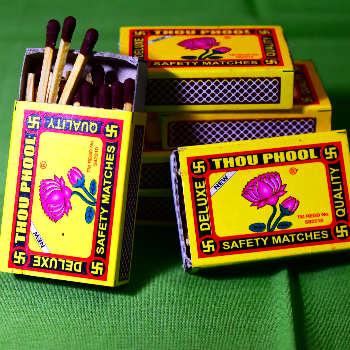In the bustling town of Madurai, nestled among the vibrant markets and lively streets, lives Arjun, a small business owner who runs a quaint tea stall. His day, like many others in India, begins before the sun rises. Amidst the aroma of brewing chai and the clinking of cups, Arjun faces a challenge that many might overlook the need for a reliable source of ignition.
The Humble Match Box A Practical Solution
Arjun’s tea stall, like countless others across the country, relies on the humble match box for its daily operations. Each morning, he lights up his stove to prepare the first batch of tea, welcoming early birds with a steaming cup. You might think, "Why not use a lighter or another modern tool?" But in many parts of India, particularly in rural areas and small towns, match boxes remain the most accessible and affordable option.
Understanding the Client Persona
Arjun represents a segment of the Indian population that values practicality and reliability. These are individuals, mostly small business owners and rural households, who prioritize cost-effectiveness and ease of access. For them, a match box is not just a tool but a daily essential. It’s affordable, easy to use, and available in every corner shop, making it an indispensable part of their lives.
The Emotional Connection
Beyond practicality, there is an emotional connection to these small, seemingly insignificant items. For Arjun, the match box is a symbol of his father’s legacy. His father, who started the tea stall decades ago, always emphasized the importance of starting the day with a fresh match and a positive outlook. This daily ritual has become a tradition, passed down through generations.
Another poignant story is that of Meera, a housewife in a rural village in Tamil Nadu. For Meera, the match box is a lifeline during the frequent power cuts that plague her village. When the electricity goes out, and darkness envelops her home, a single matchstick brings light and comfort to her family. It’s a simple yet powerful tool that empowers her to continue her household tasks without interruption.
The Ripple Effect of Accessibility
Consider the case of a small village in Andhra Pradesh where a local cooperative introduced affordable match boxes to the community. The accessibility of these match boxes led to a significant improvement in the villagers' quality of life. Farmers used them to light lamps while working late evenings during harvest season, and small shop owners like Arjun found them indispensable for their daily operations. The ripple effect was evident as improved productivity led to better economic outcomes for the entire community.
SEO Optimization Why Match Boxes Matter
The story of Arjun and Meera is not unique. Across India, millions rely on match boxes to ignite their stoves, light their homes, and power their livelihoods. Understanding their needs is crucial for anyone looking to penetrate this market. By focusing on the affordability, accessibility, and emotional significance of match boxes, businesses can effectively cater to this demographic.
Furthermore, the environmental impact of match boxes is significantly lower compared to other ignition tools, making them a sustainable choice for eco-conscious consumers.
More Than Just a Product
In the grand scheme of things, a match box may seem trivial. Yet, for people like Arjun and Meera, it is a vital part of their daily lives. It’s a tool that enables them to overcome practical challenges and maintain cherished traditions. As we strive to understand the needs of small business owners and rural households in India, it’s essential to recognize the profound impact of these simple products.
By appreciating the value of match boxes, we not only address a practical problem but also acknowledge the emotional and cultural significance they hold in the hearts of millions. It’s a reminder that sometimes, the smallest tools can have the greatest impact.
Visit Vyaparify Site:
https://id.vyaparify.com/sri-kamatchiammal-match-works 
